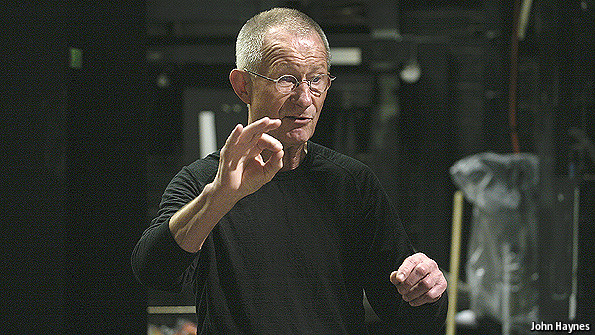REGISTRATION NOW OPEN:
April 4-5th 2014, Minghella Building, University of Reading, Whiteknights Campus.
Staging Beckett’s Inaugural conference on 4th – 5th April 2014 will focus on the history, documentation and analysis of Beckett’s theatre in performance in the UK, Ireland and internationally.
Staging Beckett: The Impact of Productions of Samuel Beckett’s Plays in the UK and Ireland is an AHRC-funded project which runs from 2012-2015. It is a collaboration between the Universities of Reading and Chester and the Victoria and Albert Museum, London. The project is compiling a database of all professional productions of Beckett’s plays in the UK and Ireland, with accompanying research resources. The project’s conferences are: Staging Beckett: Constructing Performance Histories (Reading April 4-5, 2014), Staging Beckett in the Regions (Chester, 11-12 September, 2014), and Samuel Beckett and Contemporary Theatre Cultures (Reading, April 2015).
Staging Beckett: Constructing Performance Histories features papers on productions of Beckett from across the globe, including Belgium, Brazil, Hungary, India, Ireland, Mexico, Poland, Turkey, the United States and the UK. Topics will cover Beckett and stage design, Beckett’s theatrical intersections with Pinter and with Shakespeare, staging Beckett in situations of censorship, or crisis and resistance from besieged Sarajevo to the Occupy movement in Zuccotti Park New York, staging Beckett beyond the theatrical frame, and performance histories and perspectives.
Registration fee: £50 per day waged; £30 per day students, seniors and unwaged.
Keynote Lecture: ‘Beckett and the Non-Place in Irish Performance’, Professor Brian Singleton, Trinity College Dublin, Friday 4th April, 2.30pm
Practitioners’ Panel: ‘Staging Beckett Now’: Saturday 5th April, 3pm.
Natalie Abrahami (Associate Director, Young Vic Theatre, director of Happy Days, starring Juliet Stevenson at the Young Vic, London, Feb-March 2014)
Lisa Dwan (recent performances of Not I / Footfalls / Rockaby at the Royal Court and Duchess Theatre, London, on tour during 2014)
Sarah Jane Scaife (director of site specific performances of Act Without Words II and Rough for Theatre 1 in Dublin (2013), Limerick, London and New York).
More details at:
The Staging Beckett Research Team: Matthew McFrederick (Reading), Anna McMullan (Reading), Patricia McTighe (Reading), David Pattie (Chester), Graham Saunders (Reading), David Tucker (Chester).
Provisional Schedule
Friday April 4th
9.00-10.15 Tea / Coffee and Registration
10.15-10.30 Welcome (Professor James Knowlson) and Introduction
10.30-12.00 Panel 1: Historical Intersections
- Raquel Merino Alvarez ‘Staging Beckett on Spanish censored stages: 1955-1976’
- Paulo Henrique Da Silva Gregorio ‘Beckett and the Shakespeare Revolution in the 1960s’
- David Tucker ‘That first last look in the shadows’: Using Performance Histories of Beckett and Pinter’
12.00-12.15 Tea / Coffee
12.15 – 1.45 Panel 2: Staging Beckett Globally 1
- Priyanka Chatterjee ‘Staging Beckett in Bengal: Revisiting History and Art’
- Burç Dincel ‘”They…To Play”: A Turkish Take On Beckett’
- Brendan McCall and E. K. McFall, ‘Staging Krapp’s Last Tape in Turkey, Western Australia and Norway’
1.45 – 2.30 Lunch (served in the Minghella Foyer)
2.30 – 3.30 Keynote Lecture, Professor Brian Singleton, ‘Beckett and the Non-Place in Irish Performance’
3.30 – 4.00 Tea / coffee
4.00-5.30 Panel 3: Beyond the Theatrical Frame
- Luz María Sánchez Cardona, ‘Beckett, the electronic medium of radio, and Krapp’s Last Tape‘
- Brenda O’Connell, ‘Culture Shock: (Re) Staging Beckett in caves and car parks’
- Lisa FitzGerald ‘Coming out of the Dark: Performing Place in Pan Pan’s Production of Beckett’s All that Fall‘
5.30 -7.00 Book launch and wine reception (served in the Minghella)
- Patricia McTighe, The Haptic Aesthetic in Samuel Beckett’s Drama, Basingstoke: Palgrave Macmillan, 2013
- David Tucker, A Dream and its Legacies: The Samuel Beckett Theatre Project, Oxford c. 1967-76, Oxford: Colin Smythe, 2013.
Saturday April 5th
8.30-9.00 Tea / Coffee and day registration
9.00-10.30 Panel 4: Staging Beckett Globally 2
- Robson Corrêa de Camargo ‘Playing Beckett in Brazil’
- Anita Rákóczy ‘Godots That Arrived: Waiting for Godot In Budapest Before and After 1989′.
- Ewa Brzeska ‘Violating Becketts’ Prescriptions For Theatre in Poland’
10.30-10.45: Tea / Coffee
10.45-12.15: Panel 5 Staging Beckett and Survival / Resistance
- Thomas Saunders ‘Ownership and orphaned Irish identity in Susan Sontag’s staging of Waiting for Godot‘
- Arthur Rose ‘Developing Beckett in New Orleans’
- Lance Duerfahrd ‘An Unprotesting Play within a Protest: Waiting for Godot in Zuccotti Park’
12.15-12.30 Tea / Coffee
12.30-2.00 Panel 6: Designing Beckett
- Sophie Jump, ‘Physicalising the Text: Jocelyn Herbert and Samuel Beckett’
- Anna McMullan ‘Beckett and Irish Scenography’
- Trish McTighe ‘The Tree at the Gate: Beckett and Le Brocquy’
2.00-3.00: Lunch (served in the Minghella Foyer)
3.00-4.15 Practitioner Panel: Staging Beckett Now
- Natalie Abrahami (director of Happy Days, starring Juliet Stevenson at the Young Vic, London, Feb-March 2014)
- Lisa Dwan (recent performances of Not I / Footfalls / Rockaby at the Royal Court and Duchess Theatre, London, on tour during 2014)
- Sarah Jane Scaife (director of site specific performances of Act Without Words II and Rough for Theatre 1 in Dublin (2013), Limerick, London and New York)
4.15-4.30 Tea / Coffee
4.30-6.00 Panel 7: Performance Histories and Perspectives
- Kate Dorney, ‘Beckett in the Frame: a visual history of productions documented at the Victoria & Albert Museum’
- Matthew McFrederick ‘Staging Beckett at the Royal Court Theatre’
- Nicholas Johnson and Jonathan Heron ‘The Performance Issue’
6-7pm Launch of Journal Of Beckett Studies special issue on Performance, and closing of conferen




